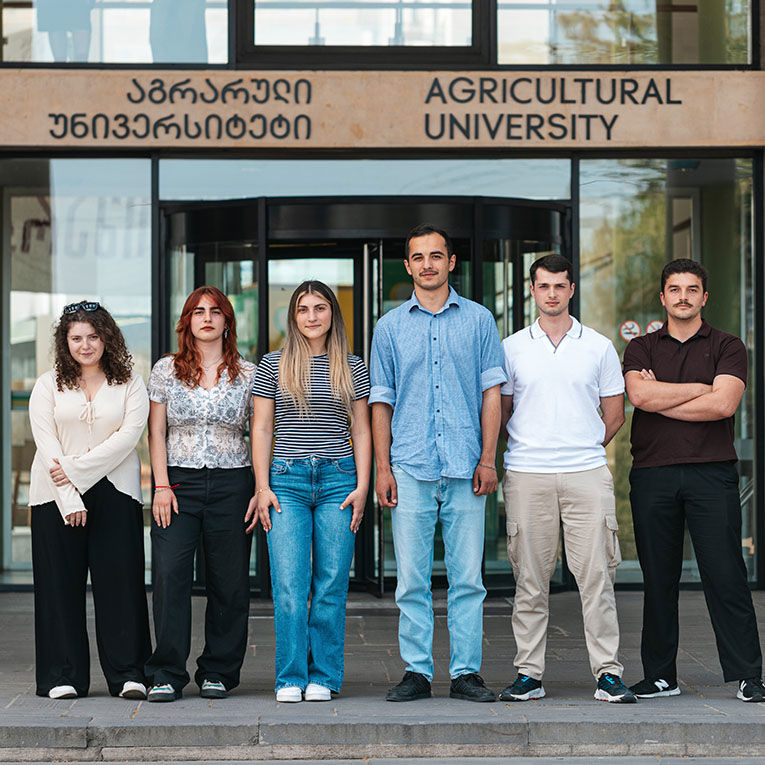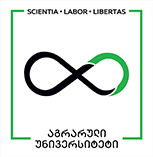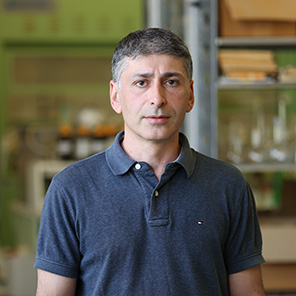School of Natural Sciences and Biotechnology
Bachelor’s Program in Viticulture-Winemaking Description
The Agricultural University of Georgia Bachelor's Program in Viticulture and Winemaking is unique in Georgia as it encompasses the entire winemaking process, from vineyard cultivation to wine bottling and marketing.
The objective of the program is to prepare graduates who can excel in both theoretical and practical aspects of viticulture and winemaking. Graduates possess knowledge and professional skills that meet modern requirements. They understand the fundamental principles of viticulture and winemaking, both in Georgia and globally, including common grape varieties, agro-technical rules and norms for their cultivation, as well as biological and ecological aspects. Additionally, graduates are proficient in classical winemaking methods and other basic technologies.
In addition to studying English, students also learn French, which is important for the oenology specialty and help them become familiar with modern technological advancements in the field.
The Bachelor's Program in Viticulture and Winemaking was developed based on the relevant programs from the University of Washington, Cornell University, and the University of California, and is tailored to align with Georgian realities and traditions.
Upon successful completion of the 4-year program, the graduate is awarded the qualification - Bachelor of Agricultural Sciences.
Action-Based Learning
Approximately one-third of the 240 credits of the Bachelor's Program in Viticulture and Winemaking is devoted to laboratory and/or practical courses. Accordingly, significant teaching time is dedicated to laboratory studies, which are based on action-based learning (learning-by-doing). This approach allows students to learn the profession through individual work, performing tasks, tests, and analysis independently.
Each year, a Student Wine Festival is held on Kakha Bendukidze Campus, where faculty, wine specialists, wine companies, and representatives from the wine agency gather to sample and evaluate student-produced wines.
This festival is a key component of the practical training for the Bachelor’s Program in Viticulture and Winemaking. Fourth-year students of the "Microvinification and Wine Festival Simulation" course prepare their signature wines at the Viticulture and Winemaking Academy. As a culmination of their independent work, students are required to produce both red and white wines, including Kvevri and Classic varieties.
Students select the grape variety and technology, pick and pre-treat the grapes, manage and regulate alcoholic fermentation, malolactic fermentation, and disease prevention. They also determine the wine’s physico-chemical parameters, conduct tastings for quality assessment, ensure wine stability, and bottle the finished product.
Additionally, students learn to present winemaking countries, regions, grape varieties, and technologies. During the tasting segment, they taste, evaluate, and describe wines from Georgia and other countries.
Within the "Wine Marketing" course, Bachelor's Program in Viticulture and Winemaking students collaborate with students from the Free University of Tbilisi’s Bachelor’s Program in Visual Communication to design and present labels for their wines.
Areas of Employment
The employment opportunities for graduates of the Bachelor's Program in Viticulture and Winemaking are diverse, including:
- Wine-producing companies
- Wine laboratories
- Small farms
- Viticulture and winemaking consulting firms
- Non-governmental organizations and international projects related to the field
Curriculum
The curriculum for the Bachelor's Program in Viticulture and Winemaking consists of 240 credits, allocated across the following modules:
- University General Education - each student enrolled in the university's bachelor's programs, in addition to specialized subjects, also takes general subjects, contributing to the elevation of general education and the expansion of their field of interests.
- General Education in the Field of Study - this module includes such subjects as: Theoretical and Laboratory courses in General Biology, Theoretical and Laboratory courses in General Chemistry, General Physics, Calculus, Statistics, Ecology.
- Foundational Education in the Field of Study - this module covers essential foundational courses for studying the field, such as: General Microbiology, Chemistry Laboratory Practice, Foundations of Modern Biotechnology, General Biochemistry, Organic chemistry.
- Core Education in the Field of Study - this module includes the fundamental theoretical, laboratory and practical courses required to study the field such as: Soil Science, Plant Biology, Plant Genetics, Entomology for Viticulture, Wine Technology, Enochemistry, Tasting Theory and Practice and others. The module also includes the subject of Microvinification and Wine Festival Simulation, within the framework of which students at the university's Academy of Viticulture and Winery prepare their signature wines and present them at the Student Wine Festival.
- Practical Education - this module includes the subject Internship in an Organization, within which students complete internships or work in various organizations. At the end of the semester, students prepare a brief report detailing their work experience and how they applied the knowledge and skills acquired at the university in different situations.
- Elective Courses - students have the flexibility to choose additional courses based on their interests. They also have the option to pursue an additional 15 credits of courses outside the program requirements at no extra cost.
Admission conditions 2023
Code:
0050101 Copied!
Copied!
Seats Quantity 100
| National exam | Weight | Acceptable Places | Minimum Score |
|---|---|---|---|
| ქართული ენა და ლიტერატურა | 3 | ||
| უცხო ენა | 4 | ||
| Optional exam | |||
| ან მათემატიკა | 5 | 24 | 40% |
| ან ისტორია | 5 | 56 | |
| ან ქიმია | 5 | 10 | 60% |
| ან ბიოლოგია | 5 | 10 | 60% |
Subjects
ქართული ენა და ლიტერატურა
Subject Weight
3Acceptable Places
Minimum Score
უცხო ენა
Subject Weight
4Acceptable Places
Minimum Score
ან მათემატიკა
Subject Weight
5Acceptable Places
24Minimum Score
40%ან ისტორია
Subject Weight
5Acceptable Places
56Minimum Score
ან ქიმია
Subject Weight
5Acceptable Places
10Minimum Score
60%ან ბიოლოგია
Subject Weight
5Acceptable Places
10Minimum Score
60%About the School
The Agricultural University of Georgia School of Natural Sciences and Biotechnology offers 4 bachelor's programs:
- Bachelor’s Program in Chemistry
- Bachelor’s Program in Biology
- Bachelor’s Program in Food Technology
- Bachelor’s Program in Viticulture-Winemaking
Additionally, the School of Natural Sciences and Biotechnology offers the following:
- Master’s Program in Agricultural Sciences with the School of Agronomy and Landscape Management
- PhD Program in Agricultural Sciences with the School of Veterinary Medicine and the School of Agronomy and Landscape Management
The School of Natural Sciences and Biotechnology programs emphasize laboratory and hands-on learning. Laboratory and practical studies are conducted using the action-based teaching method (learning-by-doing), allowing students to learn the profession through individual work, completing tasks, tests, and analysis independently. Additionally, student groups in laboratory studies are limited to no more than 20 people, which in turn positively impacts learning outcomes.
Students at the School of Natural Sciences and Biotechnology engage in laboratory and practical studies in the fields of physics, chemistry, biology, food technology, microbiology and other subjects at teaching laboratories located at Kakha Bendukidze Campus.
Student's of the Bachelor’s Program in Viticulture-Winemaking are also provided lectures and practical training at the Agricultural University of Georgia Viticulture and Winemaking Academy and its winery, where they create their own signature wines through independent work.
In addition to the campus teaching laboratories, the students of the Bachelor's Program in Food Technology also have practical lessons at the Culinary Academy of the Agricultural University of Georgia.
Additionally, many of the school's faculty are directly and actively involved in research, including significant international projects, within the infrastructure of the Agricultural University of Georgia's scientific institutes. This involvement provides students with the opportunity to engage in scientific research from the undergraduate level, if they wish to do so. It also offers a valuable opportunity for students in master's and doctoral programs to conduct in-depth research alongside experienced researchers.

28 August 2025
ლაშა ხუციშვილი სწავლას აგრძელებს შვეიცარიაში, სადოქტორო პროგრამაზე

21 August 2025
მარიამ ნავროზაშვილი სწავლას აგრძელებს University of Strasbourg-ის და University of Freiburg-ის ერთობლივ სამაგისტრო პროგრამაზე

20 August 2025
გამოვლინდნენ კომპანია აგროსფეროს სტიპენდიანტები

11 July 2025
8000 მოსავალმა მეექვსედ უმასპინძლა აგრარული უნივერსიტეტის სტუდენტების ღვინის დეგუსტაციას
Dean

Head of the program



Coordinator







